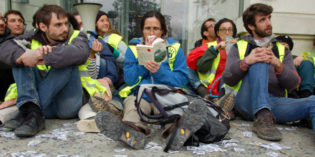Extending human and civic rights

‘Gay’ or ‘homosexual’: the words we use can divide public opinion on civil rights
Words matter; different terms and phrases can have a huge influence on how the public thinks about important issues. For example, the term “homosexual” is more likely to be used to identify a group whom some feel are outside of society, while “gay and lesbian” are much more inclusive terms. In new research, Brianna A Smith and […]

We need to understand why states object to the presence of foreign-funded NGOs
More and more countries restrict how NGOs operate, often by limiting their funding. The response is frequently to argue that these restrictions flout international law or amount to crackdowns on the opposition. Annika E Poppe and Jonas Wolff (Peace Research Institute Frankfurt) argue that the objections to NGO activity need to be taken seriously. In […]

Form a party or start a pressure group? The choice facing nascent political movements
When you’re an under-represented group, changing policy is hard. Do you form a party or start a pressure group? Disagreements about the best way forward have historically riven the Green movement in both France and the UK. Ben Farrer (Knox College) explains why activists need to think about how national institutions in their country work […]

Why has Turkmenistan’s despotic president created the characteristics of a democracy?
The incumbent President of Turkmenistan, Gurbanguly Berdymukhamedov, was duly elected in February with almost 98% of the vote. But why did a man with such a firm grip on power – he has ruled since 2007 – bother to hold elections at all? Why take the risky step of allowing other candidates to run and […]

Book review | Diploma Democracy: The Rise of Political Meritocracy
In Diploma Democracy: The Rise of Political Meritocracy, Mark Bovens and Anchrit Wille examine how Western democracies are shaped by educational inequalities that lead to gaps in political participation and governments being dominated by academic elites. While some of the authors’ solutions for these ‘diploma democracies’ are less convincing, this is a very useful account of the influence of education on […]

Votes at 16: we need a proper conversation about when adulthood begins
The vexed question of whether people should be allowed to vote from the age of 16 has returned to the Commons with Jim McMahon MP’s Private Member’s Bill. Many argue – citing the Scottish independence referendum – that it would provide a democratic stimulus. Yet the evidence for that is lacking, say Andy Mycock (University of […]

Republicans give more to charity – but not because they oppose income redistribution
Who gives more to charity – Republicans or Democrats? Michael Sances (University of Memphis) and Michele Margolis (University of Pennsylvania) found that conservative Americans donate more, even when socio-economic differences are taken into account. Could this be because they support a smaller role for the state, or as an effort to signal their philanthropic credentials? […]

Book review | The Violence of Austerity
In The Violence of Austerity, editors Vickie Cooper and David Whyte bring together contributors to explore the negative impact of austerity upon citizens in the UK, covering such topics as health, education, homelessness, disability and the environment. This is a powerful description of the consequences of austerity policies for the UK’s most vulnerable people, writes Paul Caruana-Galizia, and should be read widely. Similar […]

Turning the tide on inequality
Inequality is the root cause of many of society’s ills, argues Danny Dorling. A depressing link is emerging between where a country ranks on the league table of economic inequality and its economic, social, and political difficulties. He points to Donald Trump’s election and the Brexit referendum as examples of political fallout in two of […]

‘Desperately seeking an elderly gentleman with a large majority … to persuade Parliament to allow MPs to job-share’
Or a woman MP for that matter, write Rosie Campbell and Sarah Childs (Birkbeck). But they must be adored by their parliamentary and local constituency party so that both will be happy for them to stand as half of one of the first MP job-shares at the next General Election. We think it might take […]


 Democratic Audit's core funding is provided by the Joseph Rowntree Charitable Trust. Additional funding is provided by the London School of Economics.
Democratic Audit's core funding is provided by the Joseph Rowntree Charitable Trust. Additional funding is provided by the London School of Economics.